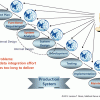Strategic advice to leverage new technologies
Technology is at the heart of nearly every enterprise, enabling new business models and strategies, and serving as the catalyst to industry convergence. Leveraging the right technology can improve business outcomes, providing intelligence and insights that help you make more informed and accurate decisions. From finding patterns in data through data science, to curating relevant insights with data analytics, to the predictive abilities and innumerable applications of AI, to solving challenging business problems with ML, NLP, and knowledge graphs, technology has brought decision-making to a more intelligent level. Keep pace with the technology trends, opportunities, applications, and real-world use cases that will move your organization closer to its transformation and business goals.
Recently Published
Extreme Scoping: An Agile Approach to Enterprise Data Warehousing and BI
It is not uncommon for seasoned project managers who use a traditional methodology on enterprise data warehouse/business intelligence (EDW/BI) projects to feel completely out of control. The requirements appear to be a moving target. Communication between staff members takes too long. Assigning tasks in a traditional way seems to result in too much rework.
All effort in data warehousing is ultimately to make information discovery and delivery possible. Though I do not intend to explore the Inmon versus Kimball theories here, I do think they hold clues for dealing with industry models. There are also models that build two layers, one for storage and the other for consumption. It is important that enterprises learn to rise above these two theories and make a meaningful blend of the two.
In my last Advisor ("Cloud Architecture Practice: Sharing a Few Observations and Lessons Learned"), I submitted a few observations and lessons learned from a real-wor












